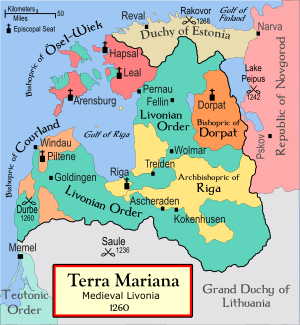Battle of Karuse
| Battle of Karuse | |||||||
|---|---|---|---|---|---|---|---|
| Part of the Livonian Crusade | |||||||
 Map of Livonia in 1260 |
|||||||
|
|||||||
| Belligerents | |||||||
| Grand Duchy of Lithuania |
Livonian Order Bishopric of Dorpat Bishopric of Ösel–Wiek Danish Estonia |
||||||
| Commanders and leaders | |||||||
| Traidenis |
Otto von Lutterberg † Friedrich von Haseldorf Hermann of Buxhoeveden Siverith |
||||||
| Casualties and losses | |||||||
| 1,600 killed | 52 knights and 600 low-rank soldiers | ||||||
The Battle of Karuse or Battle on the Ice was fought on 16 February 1270 between the Grand Duchy of Lithuania and the Livonian Order on the frozen Baltic Sea between the island of Muhu and the mainland. The Lithuanians achieved a decisive victory. The battle, named after the village of Karuse, was the fifth-largest defeat of the Livonian or Teutonic Orders in the 13th century. Almost all that is known about the battle comes from the Livonian Rhymed Chronicle, which devoted 192 lines to the battle.
The Livonian Brothers of the Sword, a crusading military order established in 1202, set out to conquer and convert to Christianity indigenous peoples of present-day Latvia and Estonia. They subjugated the Semigallians by 1250. However, after the Livonian defeats in the 1259 Battle of Skuodas and the 1260 Battle of Durbe, the Semigallians rebelled. Traidenis, who became Grand Duke of Lithuania in 1269 or 1270, supported the rebellion.
In winter 1270, the Livonian Order invaded Semigalia. However, after learning that a large Lithuanian army had also invaded the region, Master Otto von Lutterberg decided to retreat to Riga. The Lithuanians marched north, reaching as far as the island of Saaremaa, which they were able to reach because the Baltic Sea was frozen. The Lithuanian army plundered the area, taking much war loot. It is unclear whether Semigallians joined the Lithuanians and participated in this campaign – contemporary sources do not mention them, but later sources such as Jüngere Hochmeisterchronik and Dionysius Fabricius always mention their participation.
...
Wikipedia
